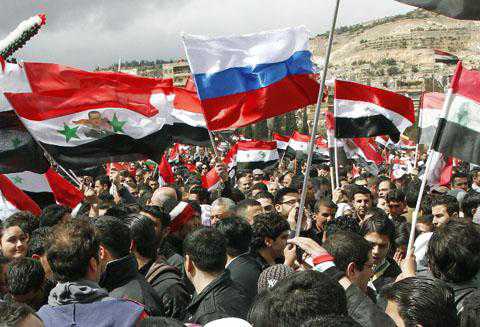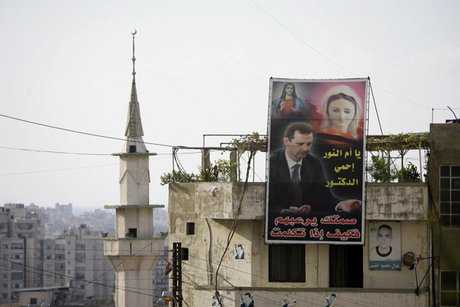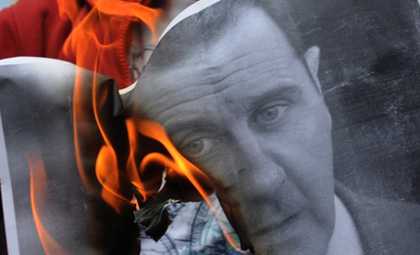Supporters of Syria’s President Bashar al-Assad hold up national flags and a Russian flag as they attend a rally at Umayyad square in Damascus, Syria, March 15, 2012.

While the Turkish government is among those at the forefront of condemning Syria’s brutal crackdown on dissent, the country’s large Alawite minority, known as Alevis in Turkey, has a different perspective.
At a meeting of Alevis in central Istanbul, Ali Kenanoglu, speaks about the situation in Syria and criticizes the Turkish prime minister’s strong support for the Syrian opposition.
Kenanoglu is the head of the Hubyar Sultan Alevi cultural society in Istanbul. He says the prime minister’s support may play well among the mainly Sunni supporters of the ruling AK party, but it is creating growing unease among Alevis in Turkey.
He says the attitude of the prime minister and government is really worrying many Alevis. He says the Syrian opposition is not about democracy. Kenanoglu says some of the groups fighting the Syrian government invoke fears among Alevis of persecution they suffered in the past from Sunni leaders.
Last month, Turkish Alevis rallied close to the Syrian border in support of Syrian President Bashar al-Assad. That was a step too far for most Alevis in Turkey, says Kamil Aykanat, head of the Haci Bektas Culture Foundation, another Alevi group based in Istanbul.
But Aykanat says while there are some religious and cultural differences between Syrian Alawites and their Turkish cousins, they share a common identity.
He says his people are Anatolian Alevis and those in Syria are Arab Alevis. But he says wherever you go in the world, if you use the word Alevi or Alawite, you are connected by a brotherhood.
There are no official figures for the Alevi population in Turkey, as their religious beliefs are not recognized by the state. But it is believed that they make up as much as a quarter of the Turkish population.
Many Turkish Alevis are deeply suspicious of the Sunni roots of the ruling AK party, according to political commentator Soli Ozel of the Turkish Newspaper Haberturk. He says those suspicions are getting worse with the government increasingly perceived by Alevis to be taking a pro-Sunni stance towards Syria.
“In a region where the lines and swords are drawn along sectarian lines, I really don’t know how Turkey can actually keep itself above the fray. And what kind of impact this might have on Turkey’s own Sunni Alevi divide remains to be seen. But that creates some tension in my view,” Ozel said.
Alevis do not pray in mosques, and men and women worship together. They are viewed with suspicion, if not outright hostility, by many in Turkey’s Sunni majority.
Turkish Alevis have been the victims of persecution and widespread killings. The most recent, in 1993, took place when dozens of Alevis attending a cultural festival died when their hotel was set on fire by a pro-Islamic mob.
Culture foundation head Aykanat says there is growing concern that if the current crisis in Syria descends into a Sunni-Alawite conflict, it may spill over into Turkey.
But he says Alevis in Turkey will be organized and have solidarity if their situation deteriorates. He says they are aware of what happened to their ancestors in the past.
At an Istanbul Alevi place of worship, there is unease about the events in Syria. One man says, however, he is confident Sunnis and Alevis share a common Turkish identity that transcends their differences.
He says if it becomes a Sunni-Alawite confrontation in Syria, then he would be very worried, as it could come to Turkey. But he says Turkish people have changed, and there is more common sense between Sunnis and Alevis, so he hopes it will not come to that.
But with the Turkish media broadcasting horrific pictures out of Syria, and with many channels describing the violence in sectarian terms, there are fears that tensions from the Syrian crisis could rise in Turkey.
via Turkey’s Alawite Community Worried About Syria Conflict | News | English, VOA



